LAKE SEBU, South Cotabato (MindaNews / 30 June) – At Crossing Luib in Barangay Talisay here, Jeanalyn Valenzuela, a mother of three, counted 1,779 pesos in exchange for around 290 kilograms (kg) of talong (eggplant) and pipino (cucumber).
Transporting the freshly harvested vegetables using their Korean-made Kia Bongo 4×4 truck driven by her husband Enrique, it took less than 30 minutes for the couple to finish the “kaliwaan” (instant exchange of goods and cash) transaction with the buyer.
Two farmhands, both T’boli natives, provided the muscles to load and unload the eggplants and cucumbers from the farm less than a kilometer away on rugged roads from the highway.
After Jeanalyn finished counting the cash handed by the buyer, she stared blankly at the horizon and then shook her head as the buyer sped off with their crops bound for the markets in the lowlands.
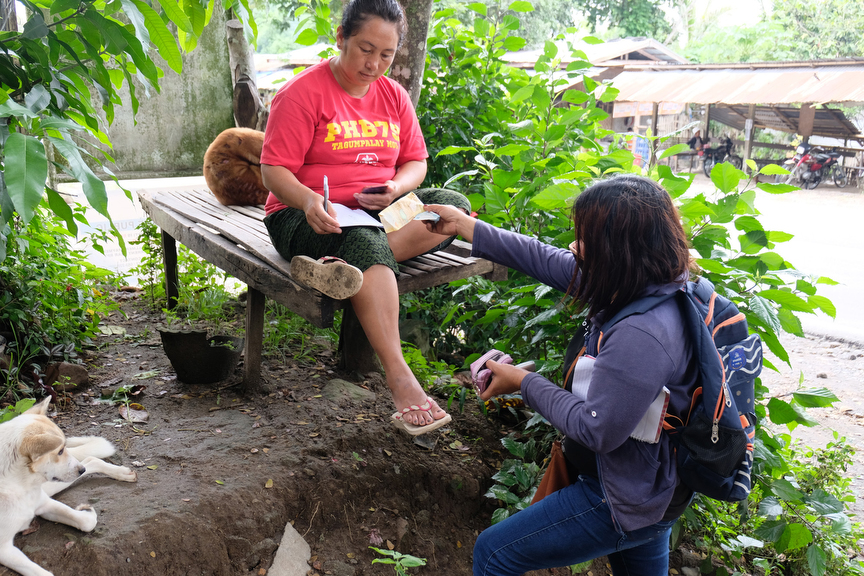 Jeanalyn Valenzuela and the buyer doing their transaction along the highway in Barangay Talisay, Lake Sebu, South Cotabato on 24 June 2020. MindaNews photo by BONG S. SARMIENTO
Jeanalyn Valenzuela and the buyer doing their transaction along the highway in Barangay Talisay, Lake Sebu, South Cotabato on 24 June 2020. MindaNews photo by BONG S. SARMIENTO
The highland town of Lake Sebu is nestled at least 700 meters above sea level and is about an hour away by vehicle from Koronadal City, the capital of South Cotabato.
“This is not even enough to pay our expenses and the wages of our laborers for today,” she told MindaNews.
According to the Regional Tripartite Wage and Productivity Board, the daily minimum wage rate for workers in the agriculture sector is P315.
That day, 24 June 2020, at least five persons were seen working at the farm when the couple sold 212 kg of eggplant and 75 kg of cucumber to the vegetable trader.
What pulled the proceeds was the farm-gate buying price of eggplant at four pesos per kg, so dirt cheap, noted Enrique, fondly called Ricky.
“There is an oversupply of talong these days,” he stressed in the vernacular.
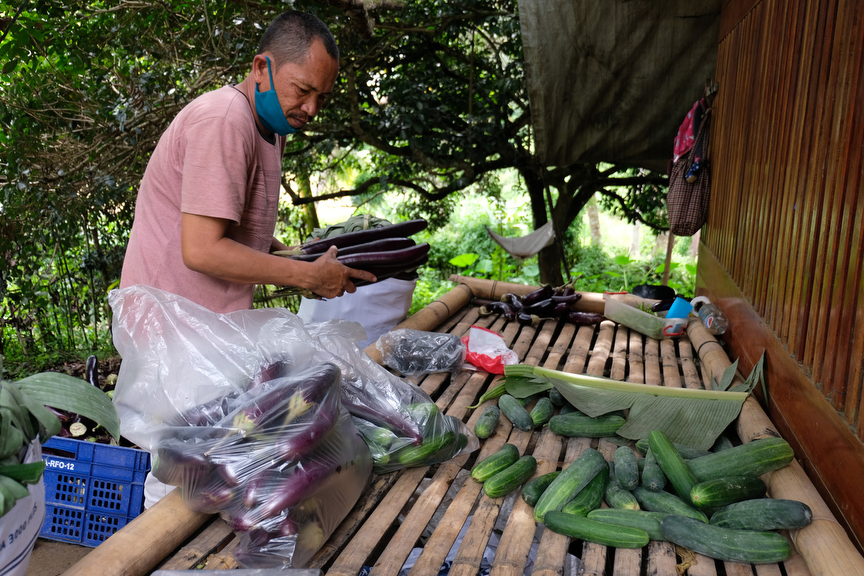 Enrique Valenzuela sorts vegetables at his farm in Lake Sebu, South Cotabato on 24 June 2020. MindaNews photo by BONG S. SARMIENTO
Enrique Valenzuela sorts vegetables at his farm in Lake Sebu, South Cotabato on 24 June 2020. MindaNews photo by BONG S. SARMIENTO
Before the coronavirus disease (COVID-19) lockdown disrupted the lives of vegetable farmers here last March, farm prices of eggplant produced locally stood at P30 per kg, said Ricky, who is the marketing manager of the Lake Sebu Vegetable Growers Association.
South Cotabato first imposed an enhanced community quarantine (ECQ) or total lockdown for 14 days from March 21 to April 4, which was extended twice to April 30. The province was placed under modified ECQ from May 1 to 31, and then under modified general community quarantine (MGCQ) from June 1 until June 30.
Vegetables produced in this town, also considered as the tourism and cultural capital of South Cotabato, are mostly transported to Cagayan de Oro City, the major trading hub for vegetables in Mindanao.
Ricky said that during the COVID-19 lockdown, eggplant fetched 40 to 45 pesos per kg in Cagayan de Oro, where vegetables produced in Bukidnon, including high-value crops such as broccoli, cauliflower and lettuce, are mainly traded for the markets in the different parts of the country, including Metro Manila in Luzon and Cebu and Bohol provinces in the Visayas.
He cited “plant, plant, plant” or the “Ahon Lahat, Pagkaing Sapat (ALPAS) Laban sa COVID-19” launched by Agriculture Secretary William Dar in April for the abundance of eggplants harvest in the locality.
ALPAS, among others, encouraged the planting of vegetables that can be harvested in one to two months’ time not just by small farmers but also by families, either though backyard or urban gardening, to boost the food value chain during this pandemic.
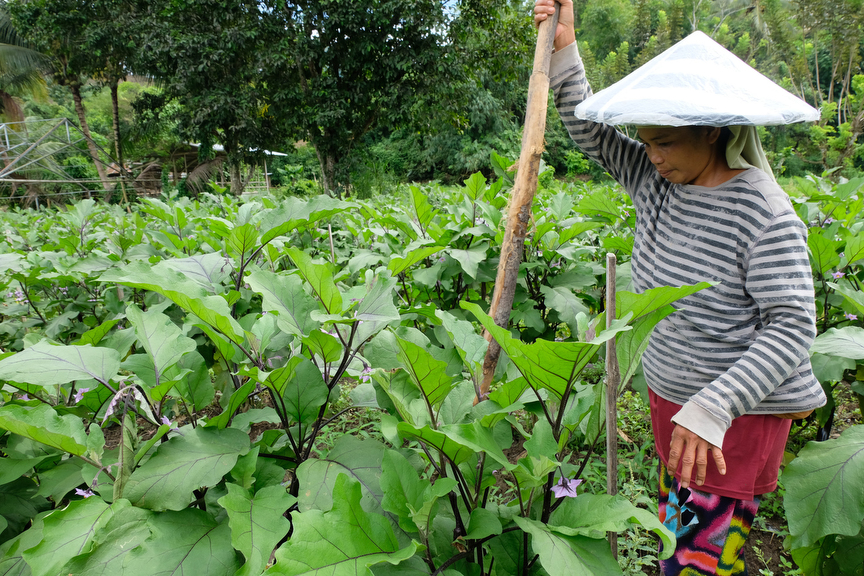 A worker punches a hole in the ground where fertilizers for the eggplants will be spread at the farm of Enrique Valenzuela in Lake Sebu, South Cotabato. 24 June 2020. MindaNews photo by BONG S. SARMIENTO
A worker punches a hole in the ground where fertilizers for the eggplants will be spread at the farm of Enrique Valenzuela in Lake Sebu, South Cotabato. 24 June 2020. MindaNews photo by BONG S. SARMIENTO
Many local farmers joined the bandwagon and planted eggplants, which is now resulting to the low price, said Ricky, who has been into vegetable farming for almost three decades now.
The Valenzuela couple has three children, and they raised them mostly through their four-hectare vegetable farm. Their eldest has earned a college degree on agriculture while the two others are still both in high school.
A tilapia-producing town, Lake Sebu, which is also famous for the T’nalak fabric woven by female T’boli natives, has a cool climate where temperature could drop to 16 degree Celsius during night time.
Of its 24,000 households, at least 5,000 are estimated to have been involved in vegetable farming, mostly small-scale ventures.
According to Ricky, whatever high value crops grown in Bukidnon province, such as lettuce, cauliflower, broccoli and sweet bell pepper, can also be cultivated in Lake Sebu.
Only a few, however, grow such high-value crops here due to technical and financial constraints, he added.
What is prevalent in Lake Sebu that local farmers sustained for decades is tomato production. Eggplant, cucumber, squash, Kentucky beans, string beans, green chili (siling haba), chili pepper (siling labuyo), bell pepper (atsal) and patola (sponge gourd), among others, are also cultivated in the municipality.
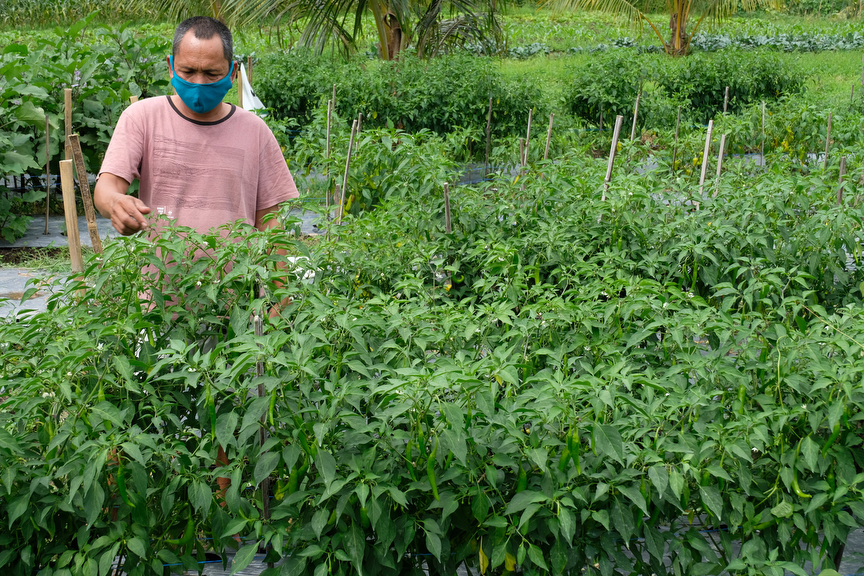 Enrique Valenzuela checks green chili at his farm in Lake Sebu, South Cotabato on 24 June 2020. MindaNews photo by BONG S. SARMIENTO
Enrique Valenzuela checks green chili at his farm in Lake Sebu, South Cotabato on 24 June 2020. MindaNews photo by BONG S. SARMIENTO
During the COVID-19 strict lockdowns from March to May, tomato growers in the municipality suffered big blows as the pandemic affected the market and transportation service.
During the period, Ricky said the town’s 52-member vegetable association managed to bring to Cagayan de Oro 15,000 crates of tomatoes from their members and non-members, including from neighboring T’boli town.
A crate of tomato fetched an average price of P350.
Of the 15,000 crates, however, 1,500 were not bought, which is equivalent to P525,000, due to lack of buyers, Ricky said, adding that of the P350 per crate, half of that goes to transport and crate costs.
“Traders in Cagayan de Oro refused to buy tomatoes because there was suddenly an oversupply due to [continuous harvest but low consumer demand]…. Many vegetables were left to rot in the farms here,” he told MindaNews.
Trucking fee is costly considering the distance. From here, a Bongo truck, with a load of two metric tons or 2,000 kg, can reach Cagayan de Oro from 8 to 12 hours, and up to 14 hours if it carries 3,000 kg, via Carmen town in North Cotabato.
During the hard lockdown from March to May, some farmers in the locality did not harvest their tomatoes and other vegetables thinking there was a total transport restriction, Ricky said.
To help curb farmers’ losses, some local government units in South Cotabato bought the produce of local vegetable farmers, but far in between, during the lockdown to come with the usual relief packs consisting of rice and canned goods they distributed to their constituents.
Harmie Jay Hechanova, Department of Agriculture-12 high value crops coordinator, said they issued food passes to allow farmers to access the markets during the lockdown.
“We gave the food passes to those transporting agricultural products so they will have unhampered access to the different localities and even the regional borders,” Hechanova separately told MindaNews.
He admitted though that there were instances when vehicles with food passes were still held back by checkpoints.
Ricky admitted having been stopped at some checkpoints strictly implementing the lockdown orders of their mayors, but allowed passage later after informing the DA regional office, which, according to him, was available 24/7 then to assist stranded food transporters.
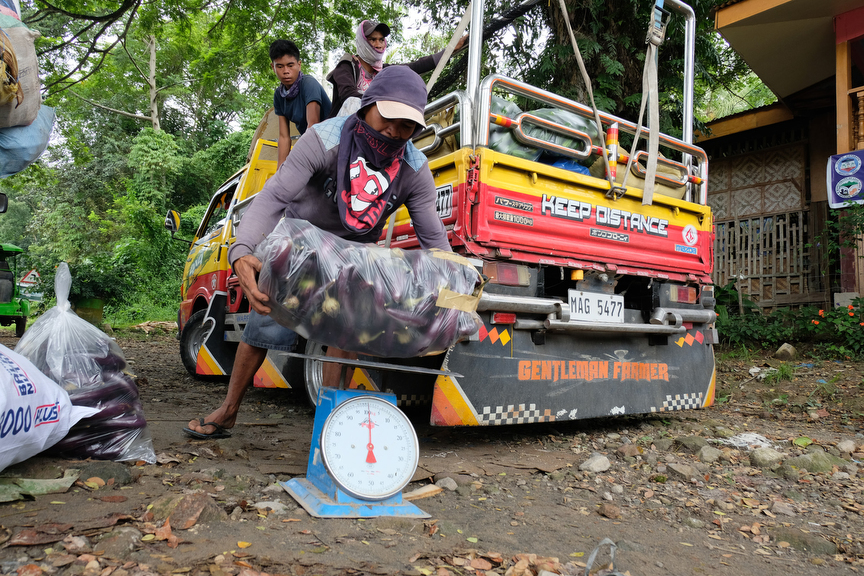 A laborer weighs the eggplant harvesyed at the farm of Enrique Valenzuela in Lake Sebu, South Cotabato on 24 June 2020. MindaNews photo by BONG S. SARMIENTO
A laborer weighs the eggplant harvesyed at the farm of Enrique Valenzuela in Lake Sebu, South Cotabato on 24 June 2020. MindaNews photo by BONG S. SARMIENTO
On the other hand, he pointed out the repercussion to locals who used the food passes to deliver vegetables to other places.
“When I came back, I was considered a PUM (person under investigation) and must be quarantined for 14 days,” Ricky lamented, stressing that those who deliver food products should not be subjected to such process if they observed the proper health safety protocol.
He did not show any signs or symptoms of COVID-19 and was released after seven days.
The curfew imposed by different LGUs during the lockdowns also had a hard effect on vegetable producers who transport their products.
“If you go back during curfew hours and they see you have an empty load, some checkpoints will not allow you to pass through, which is causing undue delays if you’re trying to catch up on short-term deliveries,” Ricky said.
DA-12’s Hechanova said they are working out the institutionalization of express lanes at the various checkpoints in the region for food transporters as part of the “new normal” due to the COVID-19 pandemic.
“Vegetables are perishable goods and they should be given special privilege especially now that we are in a pandemic,” he stressed.
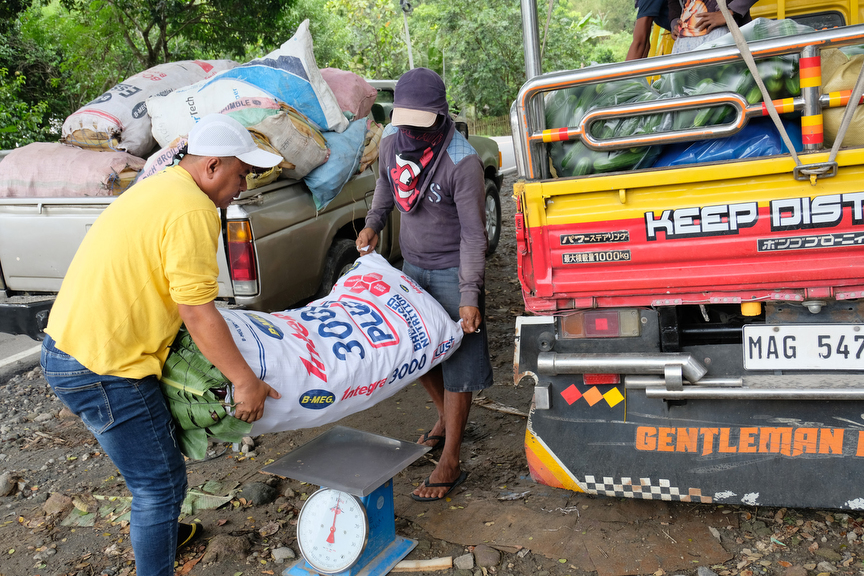 Two men carefully weigh a sack of eggplants harvested at the farm of Enrique Valenzuela in Lake Sebu, South Cotabato on 24 June 2020. MindaNews photo by BONG S. SARMIENTO
Two men carefully weigh a sack of eggplants harvested at the farm of Enrique Valenzuela in Lake Sebu, South Cotabato on 24 June 2020. MindaNews photo by BONG S. SARMIENTO
Ricky believed that local vegetable farmers can survive the new normal by planting short-term crops (eggplant, cucumber, pechay) that are affordable and dictated by the market as well as high value crops such as lettuce, salad tomato and sweet bell pepper, the last selling as high as P80 per piece at Metro Manila malls.
He called on the Department of Agriculture to provide local farmers here with financial and technical assistance so they can grow high-value crops to help increase their income.
Ricky stressed that malls in Koronadal City, the capital of South Cotabato, have been sourcing high-value vegetables such as broccoli and lettuce from Cagayan de Oro, with one trader supplying 700 kg of lettuce to one big mall weekly.
Lettuce and broccoli are being grown in Lake Sebu but by few farmers only, hence they can’t meet the demand in the province, lamented Ricky.
To boost the production of lettuce and broccoli in South Cotabato, he urged the DA to train and equip with green houses the local farmers.
Ricky also urged the DA to deploy a team that will focus solely on local vegetable farmers and will go around regularly in the communities to find out their needs.
Most farmers here have little education and it is not their character to visit offices, so it should be the DA that should come to them to know their needs, he added.
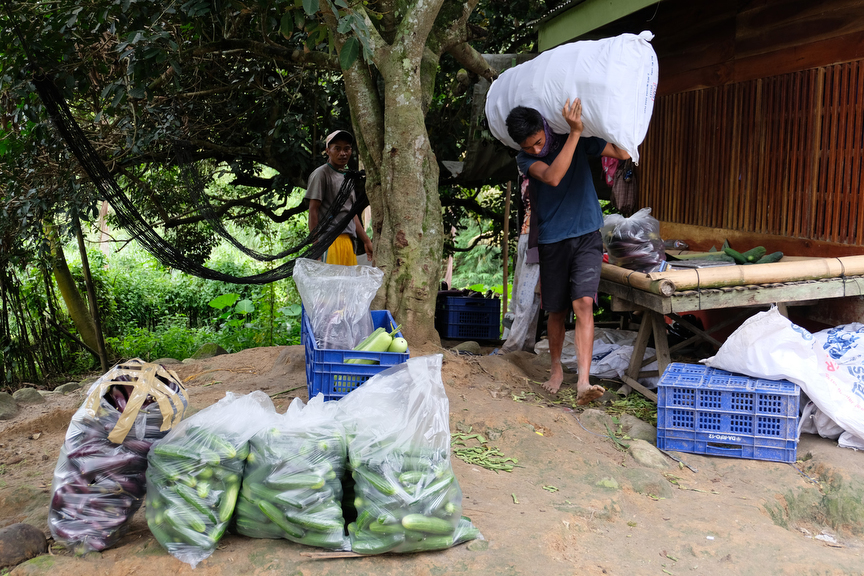 A farmhand carries a sack of eggplants at the farm of Enrique Valenzuela in Lake Sebu, South Cotabato on 24 June 2020. MindaNews photo by BONG S. SARMIENTO
A farmhand carries a sack of eggplants at the farm of Enrique Valenzuela in Lake Sebu, South Cotabato on 24 June 2020. MindaNews photo by BONG S. SARMIENTO
Ricky also stressed the need for modern farming techniques to take root in the locality considering the thinning manpower availability as many have been looking to work outside the farm while others have become dependent on the Pantawid Pamilyang Pilipino Program, the government’s conditional cash grant for poor families.
“We are not high tech. How I wish we can have the equipment that can finish the planting process in three days what manual labor could complete in 15 days,” he said.
With the COVID-19 pandemic still raging, Ricky noted that vegetable farmers are bracing for the worst, especially with the development in Cebu City, a main market for vegetable farmers in Mindanao.
On June 29, SunStar Cebu reported that Cebu City has at least 4,962 COVID-19 cases. Citing data from the Cebu City Health Department, it noted that of the figure, 2,210 are active cases, 2,596 have recovered and 156 had died.
President Rodrigo Duterte reverted Cebu City to enhanced community quarantine (ECQ) starting June 16 to 30, from modified ECQ, due to the surge of COVID-19 cases there spreading through community transmissions in several barangays.
Environment Secretary Roy Cimatu, Duterte’s point man for COVID-19 response in Cebu City, has placed several barangays in the city under total lockdown because of the number of COVID-19 cases.
“We fear that if Cebu becomes a COVID-19 hotspot, it will tremendously affect the transport of goods and people. It will have a huge impact on vegetables produced in Mindanao because Cebu City is a main market,” Ricky said.
“When the area is placed under lockdown, the movement of traders and the people is limited, which will hurt our produce,” he added.
(Bong Sarmiento of Koronadal City is Vice Chair of the Mindanao Institute of Journalism, which runs MindaNews. The production of this special report was made possible with support from Internews’ Earth Journalism Network)
